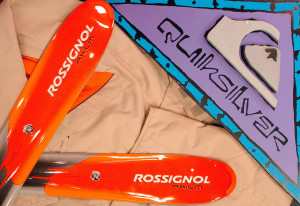Quiksilver Files for Bankruptcy Protection in Delaware
Surfwear retailer says sprawling operations damaged brand. Oaktree to take over after supplying $175 million in financing
Quiksilver Inc., the California clothing chain that helped spread surfer and skateboarder styles around the world, filed for bankruptcy with a plan to hand control over to its senior lenders.
The company, rooted in the seaside cultures of Australia and Southern California, failed to pull off a turnaround begun in 2013, Chief Financial Officer Andrew Bruenjes said in court papers filed Wednesday. The Huntington Beach, California-based retailer had been trying to overhaul an organization that was so spread out that it was hurting operations.
“This framework created a fragmented enterprise with regional brand inconsistencies,” Bruenjes said. Almost two-thirds of revenue comes from sales outside the U.S., according to court documents.
The company’s footwear is designed in Huntington Beach, a haven for surfers and punk rock fans. Clothing and accessories are designed at an operations hub in the seaside resort town of Saint-Jean-de-Luz, France. European and Asian operations aren’t affected by the bankruptcy, Quiksilver said.
Under a proposal announced Wednesday, senior lender Oaktree Capital Management LP will swap its debt claims for a majority stake in the reorganized company. Quiksilver will seek court approval of that proposal and a related plan to borrow $175 million from affiliates of Oaktree. The new loan will be used to finish the company’s restructuring and cover the cost of the bankruptcy.
Surfer Styles
The Quiksilver brand was founded in Australia in 1969. In 1976 the current company licensed the brand and began making wetsuits and helmets, as well as clothing aimed at “mountain and ocean lovers.” It sells through its own stores and specialty surf and skateboarding shops. As of April 30, the company had about 700 stores.
Quiksilver rode the fashion trend toward surfer and skater styles in the 1990s and early 2000s, along with names like Billabong International Ltd. and Pacific Sunwear of California Inc. The company, which teamed with athletes such as surfer Kelly Slater and skater Tony Hawk, sponsored surfing competitions around the world.
A shift in tastes — along with broader pressures on the apparel industry — took a toll. After a period of expansion, Quiksilver struggled to compete with fast-fashion retailers like H&M, which lured its teen customers with lower prices and on-trend clothes.
The chain suffered a 13 percent decline in sales last year, with its net loss widening to $309.4 million. It listed total debt of $826 million and assets of $337 million in its bankruptcy filing in Wilmington, Delaware. About $500 million in debt would be cut under the proposed restructuring plan, according to a regulatory filing.
Quiksilver is the latest chain to stumble in a changing retail landscape. Private-equity firms and distressed-debt investors have taken advantage, snapping up well-known clothing brands like Wet Seal Inc. and Frederick’s of Hollywood Inc., as well as electronics chain RadioShack Corp., in bankruptcy sales.
The case is In re Quiksilver Inc., 15-11880, U.S. Bankruptcy Court, District of Delaware (Wilmington).

